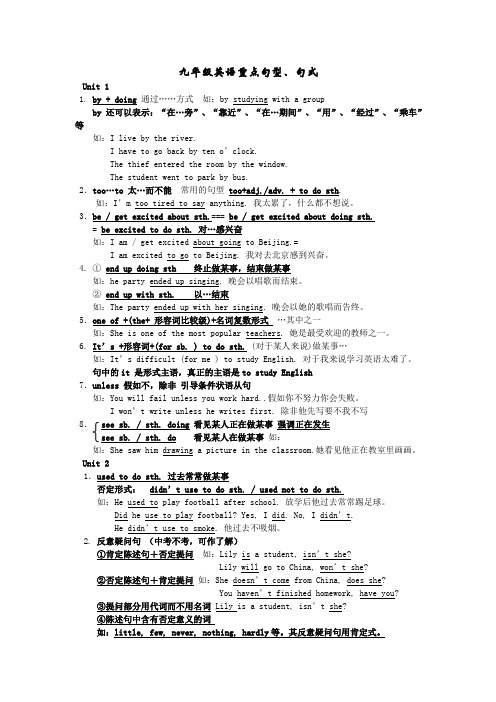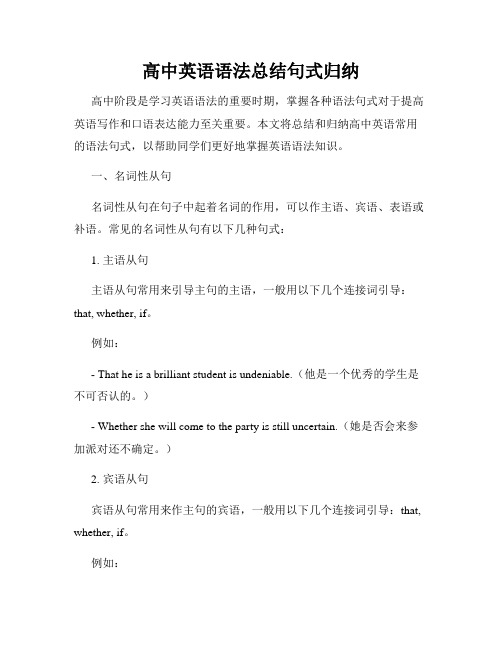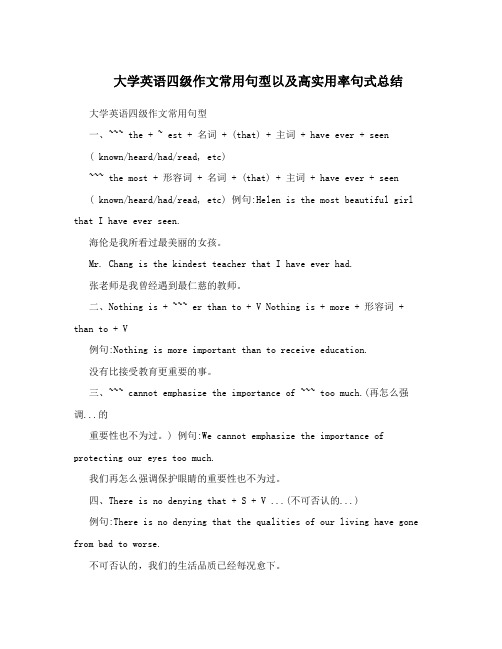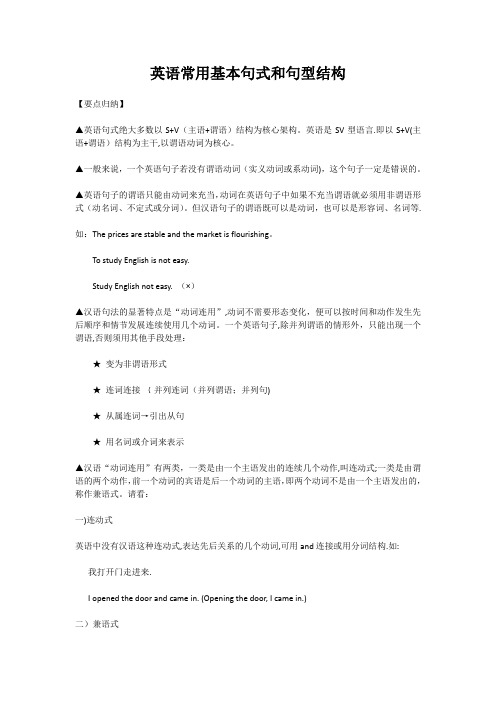英语重点句型句式归纳总结
英语重点句型句式归纳总结

九年级英语重点句型、句式Unit 11. by + doing通过……方式如:by studying with a groupby 还可以表示:“在…旁”、“靠近”、“在…期间”、“用”、“经过”、“乘车”等如:I live by the river.I have to go back by ten o’clock.The thief entered the room by the window.The student went to park by bus.2.too…to 太…而不能常用的句型too+adj./adv. + to do sth.如:I’m too tired to say anything. 我太累了,什么都不想说。
3.be / get excited about sth.=== be / get excited about doing sth.= be excited to do sth. 对…感兴奋如:I am / get excited about going to Beijing.=I am excited to go to Beijing. 我对去北京感到兴奋。
4. ①end up doing sth 终止做某事,结束做某事如:he party ended up singing. 晚会以唱歌而结束。
②end up with sth. 以…结束如:The party ended up with her singing. 晚会以她的歌唱而告终。
5.one of +(the+ 形容词比较级)+名词复数形式…其中之一如:She is one of the most popular teachers. 她是最受欢迎的教师之一。
6. It’s +形容词+(for sb. ) to do sth. (对于某人来说)做某事…如:It’s difficult (for me ) to study English. 对于我来说学习英语太难了。
初中英语知识点归纳常用句型及句式转换

初中英语知识点归纳常用句型及句式转换英语学习中,句型和句式是非常重要的基础知识。
掌握常用的句型和灵活运用句式可以帮助我们更好地理解英语语法和提高语言表达能力。
下面是初中英语中常见的句型和句式转换的归纳总结。
一、肯定句和否定句的转换1. 肯定句:主语 + 动词 + 其他成分否定句:主语 + 助动词 do/does/did + not + 动词 + 其他成分例句:He is a doctor.(肯定句)He is not a doctor.(否定句)2. 肯定句:主语 + am/is/are + 名词/形容词 + 其他成分/地点/时间否定句:主语 + am/is/are + not + 名词/形容词 + 其他成分/地点/时间例句:They are students.(肯定句)They are not students.(否定句)3. 肯定句:主语 + 动词 + 副词/介词短语 + 其他成分否定句:主语 + 助动词 do/does/did + not + 动词 + 副词/介词短语 + 其他成分例句:She speaks English fluently.(肯定句)She does not speak English fluently.(否定句)二、一般疑问句和特殊疑问句的转换1. 一般疑问句:肯定句:Do/Does/Did + 主语 + 动词 + 其他成分?否定句:Do/Does/Did + 主语 + 动词 + not + 其他成分?特殊疑问句:疑问词 + 一般疑问句的语序例句:She goes to school by bus.(一般疑问句)Does she go to school by bus?(特殊疑问句)2. 一般疑问句:肯定句:Am/Is/Are + 主语 + 名词/形容词 + 其他成分/地点/时间?否定句:Am/Is/Are + 主语 + not + 名词/形容词 + 其他成分/地点/时间?特殊疑问句:疑问词 + 一般疑问句的语序例句:They are students.(一般疑问句)Are they students?(特殊疑问句)3. 一般疑问句:肯定句:助动词 + 主语 + 动词 + 副词/介词短语 + 其他成分?否定句:助动词 + Do/Does/Did + 主语 + 动词 + not + 副词/介词短语 + 其他成分?特殊疑问句:疑问词 + 一般疑问句的语序例句:He speaks English fluently.(一般疑问句)Does he speak English fluently?(特殊疑问句)三、陈述句和祈使句的转换1. 陈述句:主语 + 动词 + 其他成分祈使句:动词 + 其他成分(一般省略主语 you)例句:They play football.(陈述句)Play football.(祈使句)2. 陈述句:主语 + am/is/are + 名词/形容词 + 其他成分/地点/时间祈使句:Be + 名词/形容词 + 其他成分/地点/时间例句:You are a student.(陈述句)Be a student.(祈使句)3. 陈述句:主语 + 动词 + 副词/介词短语 + 其他成分祈使句:动词 + 副词/介词短语 + 其他成分例句:She speaks English fluently.(陈述句)Speak English fluently.(祈使句)通过以上的归纳总结,我们可以更好地理解和运用常用的句型和句式转换。
初中英语重点句型结构

初中英语重点句型结构
1.主语+动词+宾语
例如:I like playing basketball.
2.主语+动词+不定式
例如:She wants to learn how to play the guitar.
3.主语+动词+形容词
例如:He is tall.
4.主语+动词+名词
例如:They enjoy swimming.
5.主语+动词+副词
例如:The dog runs quickly.
6. 主语 + be + 形容词
例如:She is happy.
7. 主语 + be + 名词
例如:He is a doctor.
8. 主语 + be + 动词 -ing
例如:They are studying.
9.一般疑问句:助动词+主语+主谓倒装
例如:Do you like ice cream?
10.特殊疑问句:疑问词+助动词+主语+谓语
例如:Where do you live?
11. 否定句:主语 + 助动词 + not + 动词
例如:She does not like swimming.
12.祈使句:动词+其他成分
例如:Shut the door.
13. There be 句型:There + be动词 + 名词例如:There is a cat.。
高中英语语法总结句式归纳

高中英语语法总结句式归纳高中阶段是学习英语语法的重要时期,掌握各种语法句式对于提高英语写作和口语表达能力至关重要。
本文将总结和归纳高中英语常用的语法句式,以帮助同学们更好地掌握英语语法知识。
一、名词性从句名词性从句在句子中起着名词的作用,可以作主语、宾语、表语或补语。
常见的名词性从句有以下几种句式:1. 主语从句主语从句常用来引导主句的主语,一般用以下几个连接词引导:that, whether, if。
例如:- That he is a brilliant student is undeniable.(他是一个优秀的学生是不可否认的。
)- Whether she will come to the party is still uncertain.(她是否会来参加派对还不确定。
)2. 宾语从句宾语从句常用来作主句的宾语,一般用以下几个连接词引导:that, whether, if。
例如:- I don't know if she can finish the task in time.(我不知道她是否能按时完成任务。
)- He asked me whether I had seen the movie.(他问我是否看过那部电影。
)3. 表语从句表语从句常用来作主句的表语,一般用以下几个连接词引导:that, whether。
例如:- My biggest concern is that we won't have enough time.(我最担心的是我们没有足够的时间。
)- The question is whether they will come to the meeting.(问题是他们是否会来开会。
)4. 同位语从句同位语从句用来解释或说明名词的内容,常用连接词that。
例如:- The fact that he won the competition surprised everyone.(他赢得比赛的事实让大家都感到惊讶。
八上英语句式总结

八上英语句式总结在八年级英语中,学生需要掌握多种句式来表达不同的意思。
以下是一些常见的八年级英语句式总结:1. 主语+谓语动词:这是最基本的句式,用于陈述一个事实或描述一个情况。
例:She sings well.2. 主语+谓语动词+宾语:在这种句式中,主语执行一个动作,这个动作作用于宾语。
例:He reads a book.3. 主语+不及物动词:这种句式中,主语不执行动作的行为。
例:The dog sleeps.4. 主语+系动词+表语:这种句式用于描述或界定主语的状态或特征。
例:She is tall.5. 主语+及物动词+间接宾语+直接宾语:这种句式常用于交流或传递信息,其中间接宾语是接收信息的对象,直接宾语是传递的信息。
例:He gave his friend a present.6. There be句型:这种句式用于描述某物或某些事物的存在。
例:There is a cat on the table.7. It 句型:这种句式中,"it"作为形式主语或形式宾语。
例:It is raining outside.8. 定语从句:这种句式用于添加附加信息来进一步描述名词。
例:The book that she is reading is interesting.9. 状语从句:这种句式用于描述时间、地点、原因、条件等。
例:He will go to the party if he finishes his homework.10. 宾语从句:这种句式用于作为宾语的从句,通常用于表达一种观点或想法。
例:She believes that honesty is important.这些是一些常见的八年级英语句式,掌握这些句式可以帮助学生更准确地表达自己的意思。
大学英语四级作文常用句型以及高实用率句式总结

大学英语四级作文常用句型以及高实用率句式总结大学英语四级作文常用句型一、~~~ the + ~ est + 名词 + (that) + 主词 + have ever + seen( known/heard/had/read, etc)~~~ the most + 形容词 + 名词 + (that) + 主词 + have ever + seen ( known/heard/had/read, etc) 例句:Helen is the most beautiful girl that I have ever seen.海伦是我所看过最美丽的女孩。
Mr. Chang is the kindest teacher that I have ever had.张老师是我曾经遇到最仁慈的教师。
二、Nothing is + ~~~ er than to + V Nothing is + more + 形容词 + than to + V例句:Nothing is more important than to receive education.没有比接受教育更重要的事。
三、~~~ cannot emphasize the importance of ~~~ too much.(再怎么强调...的重要性也不为过。
) 例句:We cannot emphasize the importance of protecting our eyes too much.我们再怎么强调保护眼睛的重要性也不为过。
四、There is no denying that + S + V ...(不可否认的...)例句:There is no denying that the qualities of our living have gone from bad to worse.不可否认的,我们的生活品质已经每况愈下。
五、It is universally acknowledged that + 句子~~ (全世界都知道...)例句:It is universally acknowledged that trees are indispensable to us. 全世界都知道树木对我们是不可或缺的。
英语常用基本句式和句型结构

英语常用基本句式和句型结构【要点归纳】▲英语句式绝大多数以S+V(主语+谓语)结构为核心架构。
英语是SV型语言.即以S+V(主语+谓语)结构为主干,以谓语动词为核心。
▲一般来说,一个英语句子若没有谓语动词(实义动词或系动词),这个句子一定是错误的。
▲英语句子的谓语只能由动词来充当,动词在英语句子中如果不充当谓语就必须用非谓语形式(动名词、不定式或分词)。
但汉语句子的谓语既可以是动词,也可以是形容词、名词等.如:The prices are stable and the market is flourishing。
To study English is not easy.Study English not easy. (×)▲汉语句法的显著特点是“动词连用”,动词不需要形态变化,便可以按时间和动作发生先后顺序和情节发展连续使用几个动词。
一个英语句子,除并列谓语的情形外,只能出现一个谓语,否则须用其他手段处理:★变为非谓语形式★连词连接﹛并列连词(并列谓语;并列句)★从属连词→引出从句★用名词或介词来表示▲汉语“动词连用”有两类,一类是由一个主语发出的连续几个动作,叫连动式;一类是由谓语的两个动作,前一个动词的宾语是后一个动词的主语,即两个动词不是由一个主语发出的,称作兼语式。
请看:一)连动式英语中没有汉语这种连动式,表达先后关系的几个动词,可用and连接或用分词结构.如:我打开门走进来.I opened the door and came in. (Opening the door, I came in.)二)兼语式如:“他请我到他家来做客。
”“我"是“请”的宾语,又是“到他家来做客”的主语。
也就是说“我”身兼两职。
英语句式表达汉语兼语式有以下几种方式:1) 将兼语式的第二个动词转化为英语的宾语补足语,常用不定式,有时用不带to的不定式,或分词,副词,形容词,名词,介词结构等。
英语重要句型总结

We named our baby Tom.
常用于这句型的动词有:appoint, call, choose, elect, entitle, find, make, name, nominate(命名)。
2) S + VT + N/Pron + Adj
Birds sing beautifully.
2) S + Vi+ prep Phrase(介词短语)
He went on holiday.
3) S + Vi+ Infinitive (不定式)
We stopped to have a rest.
4) S + Vi+ Participle (分词)
He is in good health.
5) S + Lv + Participle(分词)
He is excited.
The film is interesting.
4. S (主)+ VT (谓)+ In O(间接 宾) + D O(直接 宾)
I give you help.
8. have sth. done
9. see/ hear/ watch sb. do sth.
10. see/ hear/ watch sb. doing sth.
第五组:It 作形式主语
1. It takes sb. some time to do sth.
2. It is +(important, necessary, difficult, possible, polite…)for sb. to do sth.
- 1、下载文档前请自行甄别文档内容的完整性,平台不提供额外的编辑、内容补充、找答案等附加服务。
- 2、"仅部分预览"的文档,不可在线预览部分如存在完整性等问题,可反馈申请退款(可完整预览的文档不适用该条件!)。
- 3、如文档侵犯您的权益,请联系客服反馈,我们会尽快为您处理(人工客服工作时间:9:00-18:30)。
九年级英语重点句型、句式Unit 1by studying with a group如:by + doing1. 通过……方式还可以表示:“在…旁”、“靠近”、“在…期间”、“用”、“经过”、“乘车”by等I live by the river.如:clock.I have to go back by ten o' The thief entered the room by the window.The student went to park by bus..too+adj./adv. + to do sth to 太…而不能常用的句型2.too…m too tired to say anything. 我太累了,什么都不想说。
如:I' === be / get excited about doing sth.3.be / get excited about sth.be excited to do sth. 对…感兴奋=I am / get excited about going to Beijing.=如: I am excited to go to Beijing. 我对去北京感到兴奋。
end up doing sth 终止做某事,结束做某事4. ①晚会以唱歌而结束。
如:he party ended up singing.以…结束②end up with sth.晚会以她的歌唱而告终。
如:The party ended up with her singing.…其中之一名词复数形式 5.one of +(the+ 形容词比较级)+她是最受欢迎的教师之一。
如:She is one of the most popular teachers.做某事…对于某人来说)'s +形容词+(for sb. ) to do sth. (6. It对于我来说学习英语太难了。
's difficult (for me ) to study English. 如:It to study English 是形式主语,真正的主语是句中的it引导条件状语从句7.unless 假如不,除非 You will fail unless you work hard..假如你不努力你会失败。
如: t write unless he writes first. 除非他先写要不我不写 I won'.see sb. / sth. doing看见某人正在做某事强调正在发生8see sb. / sth. do看见某人在做某事如:如:She saw him drawing a picture in the classroom.她看见他正在教室里画画。
Unit 21.used to do sth. 过去常常做某事否定形式:didn't use to do sth. / used not to do sth.如:He used to play football after school. 放学后他过去常常踢足球。
Did he use to play football? Yes, I did. No, I didn't.He didn't use to smoke. 他过去不吸烟。
2. 反意疑问句(中考不考,可作了解)①肯定陈述句+否定提问如:Lily is a student, isn't she?Lily will go to China, won't she?②否定陈述句+肯定提问如:She doesn't come from China, does she?You haven't finished homework, have you?③提问部分用代词而不用名词 Lily is a student, isn't she?④陈述句中含有否定意义的词如:little, few, never, nothing, hardly等。
其反意疑问句用肯定式。
他一点也不懂英语,不是吗?does he? 如:He knows little English,他们几乎不明白,不是吗?did they?They hardly understood it,指人对某事物感兴趣,往往主语是人adj. 感兴趣的,3.interest ed某人具有趣味,主语往往是物指某事物/ interest ing adj.有趣的,对…感兴趣①be interested in sth.对做…感兴趣②be interested in doing sth.t interested in speaking English.He is interested in math, but he isn'如:他对数学感兴趣,但是他对说英语不感兴趣。
I am terrified of the dog.如:.害怕… be terrified of sth.4 I am terrified of speaking。
be terrified of doing sth. 如:spend 动词,表示“花费金钱、时间”5. on sth. 在某事上花费(金钱、时间)①spend…花费(金钱、时间)去做某事…doing sth.②spend He spends too much time on clothes. 他花费太多的时间在衣着如: He spend 3 months building the bridge.他花费了三个月去建这座桥。
元买这本书。
I pay 10 yuan for the book. 我花了10 pay for 花费如:take 动词有“花费”的意思常用的结构有:to read the book.takes me a day 如:It take sb. … to do sth.take … to do sth.6.how to swim 怎样游泳不定式与疑问词连用:动词不定式可以和what, which, how, where, when 等引导的疑问句连用,构成不定工短语。
如:The question is when to start. 问题是什么时候开始。
I don't know where to go. 我不知道去哪。
7. make sb./ sth. + 形容词 make you happymake sb./ sth. + 动词原形 make him laugh8.as + 形容词./副词+as sb. could/can 尽某人的…能力如: Zhou run as fast as her could/can. 她尽她最快的能力去跑。
9.take pride in sth. 以…而自豪如:His father always take pride in him. 他的爸爸总是以他而自豪10. pay attention to sth. 对…注意,留心如:You must pay attention to your friend. 你应该多注意你的朋友。
11. be able to do sth. 能做某事如:She is able to do it. 她能够做到。
12. give up doing sth. 放弃做某事如:My father has given up smoking. 我爸爸已经放弃吸烟了。
13.不再①no more == no longer如:I play tennis no more/ longer.我不再打网球。
②not …any more == not …any longer如:I don't play tennis any more/longer. 我不再打网球。
Unit 31.allow句型①allow sb to do sth 允许某人做某事如: We do not allow people to smoke in the hall.②allow doing 允许做某事③be allowed to do 被允许做某事④should be allowed to do 应该被允许做某事get their ears pierced 2.穿耳洞使(别人)做某事 get sth. done(/过去分词) 让 have sth. done如:I get my car made. == I have my car made. 我让别人修好我的车3.enough 足够形容词+enough如:beautiful enough 足够漂亮enough+名词如:enough food 足够食物enough to 足够…去做…如:I have enough money to go to Beijing. 我有足够的钱去北京。
She is old enough to go to school.她够大去读书了。
4. stop doing sth. 停止做某事 Please stop speaking.请停止说话。
stop to do sth. 停止下来去做某事 Please stop to speak.请停下来说话。
5. 看起来好像… sb. seem to do sth. = it seems that +从句如:He seems to feel very sad.It seems that he feels very sad. 他看起来好像很伤心。
6.系动词不能独立作谓语,要和表语一起构成谓语。
常用的连系动词有:look, feel, be, become, get, turn, smell, taste, stay(保持), kept等。
连系动词除be 和become名词形容词。
作表语外,一般都是接等少数词可接如:They are very happy. He became a doctor two years ago. She felt very tired.7. 倒装句:由so+助动词(be/do/will/have)/情态动词+主语意为:…也是一样She is a student. So am I. 她是一个学生,我也是。
She went to school just now. So did I . 她刚才去学校了,我也是She has finished the work. So have I . 她已经完成了工作,我也完成了。
She will go to school. So will he. 她将去学校,他也是。
8.曾经做某事:Do you ever get to school late? Yes, I do. No, I don't.Have you ever got to school late? Yes, I have. No, I haven't.9.be strict with sb. 对某人严厉如:Mother is strict with her son. 妈妈对她的儿子很严厉。
